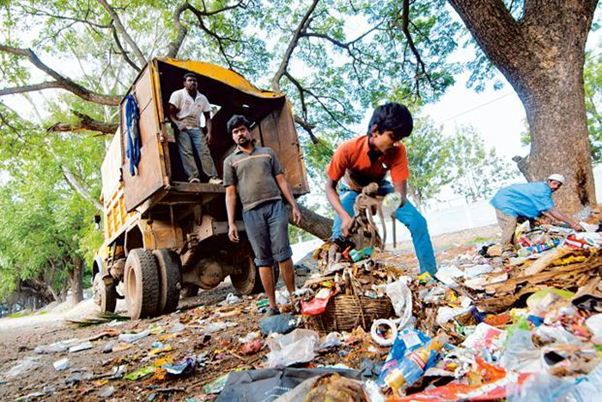Waste management has emerged as one of the critical challenges facing India’s rapidly urbanizing cities. Traditional centralized waste collection and disposal systems, heavily reliant on large landfills and transportation of waste over long distances, have proven to be environmentally damaging, economically unsustainable, and socially challenging. In response, decentralized waste processing has gained prominence as a promising solution that processes waste closer to the source—minimizing transportation, reducing landfill waste, and enabling community participation. This article explores this innovative approach through examples and strategies successfully implemented in Indian cities.
Understanding Decentralized Waste Processing
Decentralized waste processing involves locally managing and treating waste at or near its point of generation rather than relying exclusively on large-scale centralized facilities. This approach prioritizes community-level interventions such as composting organic waste, small-scale biogas plants, neighborhood recycling centers, and localized waste-to-energy units.
The core principles focus on:
- Reducing dependency on landfills by diverting organic and recyclable waste.
- Minimizing transportation costs and pollution by treating waste locally.
- Engaging communities in waste segregation, collection, and processing.
- Integrating informal waste workers into formal systems.
- Creating sustainable economic models through compost sales, recyclables, and user fees.
Case Studies of Decentralized Waste Processing in India
- Indore: A Model of Community-Level Composting and Waste-to-Energy
Indore, consistently ranked India’s cleanest city, effectively uses decentralized composting and waste-to-energy plants processing over 1,200 tonnes of waste daily. The city emphasizes source segregation of waste, enabling composting units to convert organic waste into nutrient-rich manure used in agriculture and urban gardening. Its decentralized strategy integrates a robust public participation system and efficient municipal governance. This holistic approach reduces pressure on landfills, cuts greenhouse gas emissions, and creates economic opportunities through compost sales and employment of local workers. - Pune: Network of Decentralized Biodigesters
Pune generates about 2,100 tons of municipal solid waste each day, nearly half of which is organic. The city operates a network of 26 decentralized anaerobic biodigesters that process 5 to 10 tonnes of organic waste each daily. These biodigesters produce biogas used for lighting and generate compost that supports urban green spaces. By treating waste locally rather than transporting it to a central facility, Pune reduces transportation costs and methane emissions from decomposing organic waste. These decentralized plants are often operated by private concessionaires paid through municipal tipping fees, creating a replicable and economically viable model. - Bengaluru: Community-Driven Decentralized Waste Management
In Bengaluru, initiatives such as the door-to-door collection and segregation of waste by NGOs and waste picker cooperatives have been critical. Composting hubs have been established where food scraps and garden waste are converted into high-quality compost. This decentralized model empowers residents to segregate waste at the source and supports informal waste workers by formalizing their role within the supply chain. Public-private partnerships and community education programs have facilitated better waste handling and recycling. - Gorakhpur: Localized Community Waste Management
The Purdilpur ward of Gorakhpur showcases a community-based decentralized waste management initiative supported by local NGOs and academic institutions. The project engages households in segregating and managing their waste sustainably, converting organic waste into compost through vermicomposting. This model has fostered community ownership of waste processes and illustrates how decentralization can bring sustainability through citizen participation in smaller urban wards. - Nathuawala Ward, Dehradun: Integrated Decentralized Solid Waste Model
This initiative involved collaboration among the municipal corporation, local NGO Feedback Foundation, and community members to establish a sanitation park focused on localized waste segregation and scientific composting. Residents were engaged in behavioral change programs to participate actively in waste segregation. The decentralized model here showed economic sustainability, enhanced cleanliness, and community acceptance, proving viable for small urban local bodies in hilly regions.
Key Benefits of Decentralized Waste Processing
- Environmental Impact Reduction
Decentralized processing significantly decreases the volume of waste sent to landfills, cutting down methane emissions—a potent greenhouse gas. Technologies like anaerobic digestion not only reduce waste but produce biogas, a renewable energy source. The organic compost produced mitigates the reliance on chemical fertilizers and supports urban greening. - Economic Viability and Job Creation
By valorizing waste streams locally, municipalities save on expensive transportation and landfill management costs. Operational costs can often be covered through user fees, sale of compost, and recyclables. Informal sector workers gain formal employment opportunities, enhancing social equity. - Community Engagement and Awareness
Localized systems foster direct community participation, increasing accountability and better waste segregation at the source. Community education initiatives enhance acceptance and cooperation, crucial for the success of such projects.
Challenges and Future Directions
Despite the successes, decentralized waste processing in India faces challenges:
- Ensuring consistent waste segregation by residents.
- Technical maintenance of biogas and composting facilities.
- Integrating informal sector workers comprehensively.
- Developing robust monitoring, reporting, and verification mechanisms.
- Scaling models beyond pilot wards to entire cities.
The future of waste management in India relies on expanding decentralized principles combined with smart technologies such as IoT-enabled bins, mobile apps for waste collection, and advanced composting techniques. Policy support at municipal and national levels, financial incentives, and public-private partnerships will be critical to scaling these solutions.
Decentralized waste processing represents a transformative shift in India’s approach to managing urban waste. By treating waste closer to its source, involving communities, and utilizing innovative technologies, cities like Indore, Pune, Bengaluru, and Gorakhpur demonstrate practical pathways for more sustainable, efficient, and inclusive waste management. This approach not only addresses environmental challenges but also empowers local economies and improves urban living standards. As India moves toward its sustainability goals, decentralized waste processing stands out as a vital strategy for a cleaner and greener future.

